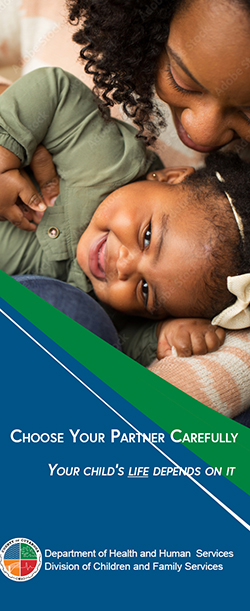Choose Your Partner Carefully
 When you choose a partner for yourself, you are choosing one for your child, as well.
When you choose a partner for yourself, you are choosing one for your child, as well.
The Center for Disease Control and Prevention (CDC) defines Intimate Partner Violence (IPV) as abuse or aggression that occurs in a romantic relationship. Intimate partner refers to both current and former spouses and dating partners. IPV can vary in how often it happens and how severe it is. It can range from one episode of violence to chronic and severe episodes over multiple years. IPV can include any of the following:
- Physical Violence is when a person hurts or tries to hurt a partner through physical force.
- Sexual Violence is forcing or attempting to force a partner to take part in a sex act, sexual touching, or a non-physical sexual event (e.g., sexting) when the partner does not or cannot consent.
- Stalking is a pattern of repeated, unwanted attention and contact by a partner that causes fear or concern for one’s own safety or the safety of someone close to the victim.
- Psychological Aggression is the use of verbal and non-verbal communication with the intent to harm a partner mentally or emotionally or to exert control.
When choosing your partner, you are not just choosing for yourself. You are choosing for your child, too! Your partner plays an important role in your child’s life. Choosing the wrong partner can be deadly! Get to know a person before you choose them as a partner.
Warning Signs
Sometimes, when you are in a relationship, you can miss the warning signs. One of the most important signs to look for is how your child acts when left alone with your partner. Is your child afraid every time you leave? Does he or she cry often? Shake with fear?
Other questions you should ask yourself. Does your partner:
- Have children of their own?
- Have good parenting skills for their own children?
- Get along with their child’s parent?
- Treated former partners well?
- Get easily angered or short-tempered when talking to you or your child?
- Call your child names or put down your child?
- Think it is funny to scare your child?
- Say you are a bad parent and not strict enough?
- Demand your constant attention?
- Deliver harsh punishment for minor misbehaviors?
- Hurt your child and blame you?
- Show anger or impatience when your child cries or throws a tantrum?
- Prevent you and your child from being with friends and family.
- Handle guns and knives around you or your child?
If you have answered yes to even a few of these questions, your child could be at risk.
NEVER ignore the warning signs!
The Facts
- No matter how much you may love your partner, no matter what their feelings for you might be, they may not love your child.
- 30% to 60% of Intimate Partner Violence perpetrators also abuse the children in the household.
- Approximately 45 million children will be exposed to violence during childhood.
- Children exposed to domestic violence often become victims of violence.
- Nearly half of female homicide victims are killed by a current or former intimate partner.
- Violence affects children from every income level and race. Each year, thousands of children end up seriously injured or killed.

Download a printable version of the Choose Your Partner Carefully Brochure.
Sources
- www.cdc.gov/intimate-partner- violence/about/index.html
- www.ncjr s.gov/pdffiles1/nij/ grants/213503.pdf
- www.thehotline.org/stakeholders/ domestic-violence-statistics
- www.nctsn.org/what-is-child-trauma/ trauma-types/intimate-partner-violence/effects
- www.thehotline.org/stakeholders/ domestic-violence-statistics

